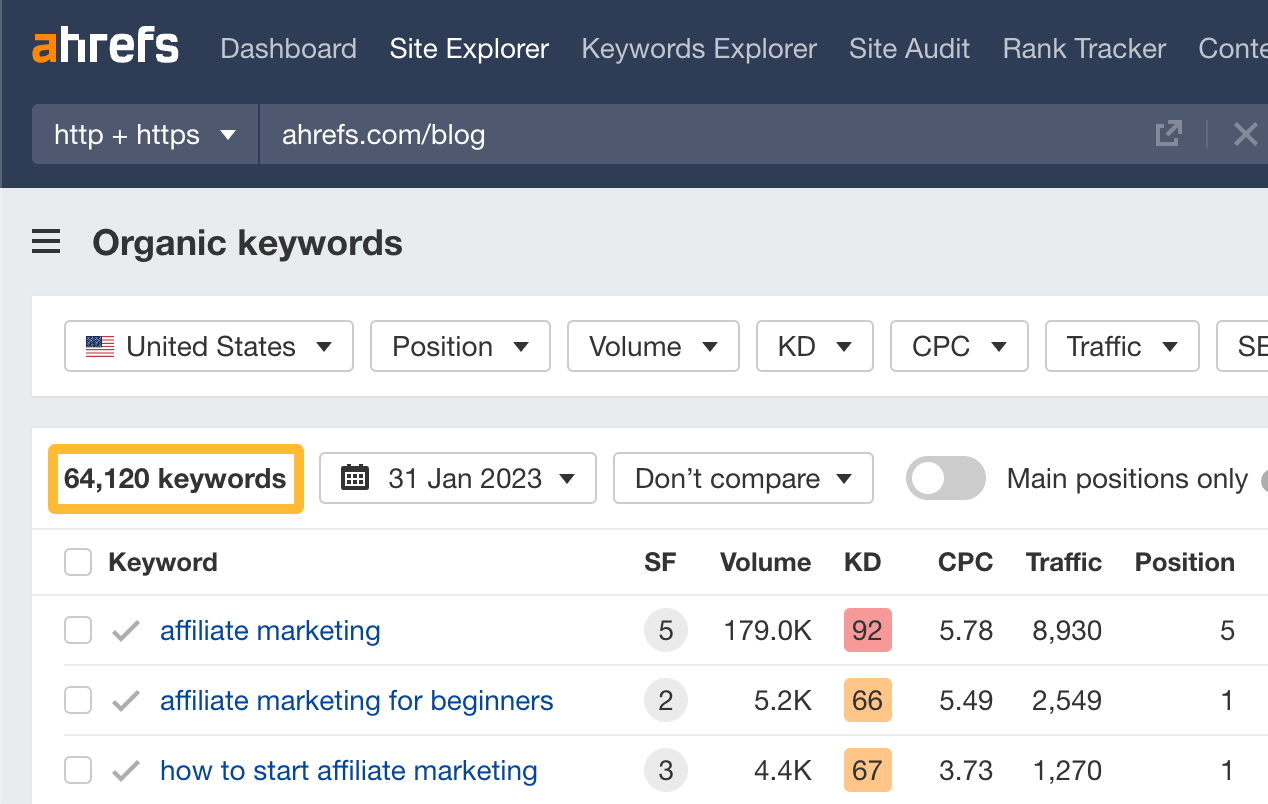Keyword research tools help identify popular search terms related to your niche. They provide data to optimize your content for better search engine rankings.
Keyword research is essential for effective SEO strategies. These tools offer insights into search volume, competition, and trends. By understanding what your audience searches for, you can tailor your content to meet their needs. This increases visibility and drives organic traffic to your site.
| Tool | Features | Pricing | Visit Site |
|---|---|---|---|
| Ahrefs | Comprehensive keyword research, competitor analysis, SERP overview, rank tracking | Starting at $99/month | visit site |
| SEMrush | Keyword and competitor research, site audits, PPC analysis, backlink tracking | Starting at $119.95/month | visit site |
| Moz Keyword Explorer | Keyword suggestions, SERP analysis, difficulty scores, click-through rates | Starting at $99/month | visit site |
| Google Keyword Planner | Keyword search volume, competition, CPC estimates | Free (with Google Ads) | visit site |
| Ubersuggest | Keyword suggestions, SEO analysis, content ideas, competitor insights | Free, $12-$40/month for premium | visit site |
| KeywordTool.io | Generates keywords from Google, Bing, YouTube, and more, with search volume and CPC | Free, $89-$199/month | visit site |
| SpyFu | Competitor keyword analysis, PPC research, backlink analysis | Starting at $39/month | visit site |
| KWFinder | Keyword research, SEO metrics, search volume, competition analysis | Starting at $29/month | visit site |
| AnswerThePublic | Visual keyword research, question-based content ideas | Free, $99/month for Pro | visit site |
| Serpstat | Keyword analysis, competitor research, rank tracking, backlink analysis | Starting at $55/month | visit site |
Popular tools like Google Keyword Planner, Ahrefs, and SEMrush offer comprehensive features for keyword analysis. They help you discover long-tail keywords and optimize your website accordingly. Using these tools effectively can give you a competitive edge, ensuring your content ranks higher in search engine results.

Credit: backlinko.com
Introduction To Keyword Research
Keyword research is the backbone of successful SEO strategies. Understanding what terms people search for helps in creating content that ranks high on search engines.
Importance Of Keywords
Keywords are the terms and phrases people type into search engines. They connect search queries with relevant content. Using the right keywords can boost your site’s visibility.
- High Search Volume: Keywords with high search volume attract more traffic.
- Relevance: Keywords must be relevant to your content and audience.
- Competition: Some keywords are highly competitive; choose wisely.
Effective keyword research identifies the most useful terms for your content. It involves analyzing search volumes, trends, and competition.
Seo Impact
Proper keyword usage significantly impacts Search Engine Optimization (SEO). It improves your website’s ranking on search engines like Google and Bing.
| Keyword Type | Impact on SEO |
|---|---|
| Short-tail Keywords | High search volume, high competition. |
| Long-tail Keywords | Lower search volume, less competition, highly targeted. |
Using long-tail keywords can be beneficial. They often have less competition and can attract highly targeted traffic.
- Identify your niche.
- Use keyword research tools like Google Keyword Planner.
- Analyze search volume and competition.
- Select a mix of short-tail and long-tail keywords.
Effective keyword research leads to better content optimization. It helps in achieving higher search engine rankings and increasing organic traffic.

Credit: www.shoutmeloud.com
Types Of Keyword Research Tools
Understanding the different types of keyword research tools is essential for effective SEO. These tools help identify the best keywords to target for your content. They can be broadly categorized into free tools and paid tools. Each type has its own set of advantages and features.
Free Tools
Free keyword research tools are accessible to everyone. They are perfect for beginners or those on a tight budget. Here are some popular free tools:
- Google Keyword Planner: Offers keyword ideas and search volume.
- Ubersuggest: Provides keyword suggestions and competitor analysis.
- AnswerThePublic: Shows popular questions and phrases around keywords.
- KeywordTool.io: Generates keywords from Google autocomplete.
Free tools are great for basic keyword research. They offer limited features but are still powerful for initial analysis.
Paid Tools
Paid keyword research tools offer advanced features and detailed insights. They are suitable for professionals and businesses. Here are some top paid tools:
- SEMrush: Comprehensive tool for keyword research and SEO audits.
- Ahrefs: Provides detailed keyword data and backlink analysis.
- Moz Keyword Explorer: Offers keyword suggestions and SERP analysis.
- KWFinder: User-friendly tool with accurate keyword difficulty scores.
Paid tools offer more accurate data and advanced features. They are ideal for in-depth keyword research and competitive analysis.
| Tool Type | Example Tools | Best For |
|---|---|---|
| Free Tools | Google Keyword Planner, Ubersuggest | Beginners, Basic Research |
| Paid Tools | SEMrush, Ahrefs | Professionals, In-depth Analysis |
Top Free Keyword Research Tools
Keyword research is the backbone of any SEO strategy. Top Free Keyword Research Tools are essential for finding valuable keywords. These tools help you understand what your audience searches for online.
Google Keyword Planner
Google Keyword Planner is a powerful tool. It provides keyword ideas and traffic estimates. Here are its main features:
- Keyword Suggestions: Get related keyword ideas.
- Search Volume: Check monthly searches for each keyword.
- Competition Level: Understand the competition for each keyword.
- Cost Per Click (CPC): See the average cost for each click.
To use Google Keyword Planner, you need a Google Ads account. It is free to create one. Once logged in, enter a keyword and explore the suggestions. This tool is perfect for finding high-traffic keywords.
Ubersuggest
Ubersuggest is another excellent free tool. It offers a range of features for keyword research:
- Keyword Overview: Get a snapshot of keyword metrics.
- Keyword Ideas: Discover related keywords.
- Content Ideas: Find popular content for your keywords.
- SEO Difficulty: Understand how hard it is to rank for a keyword.
Using Ubersuggest is straightforward. Enter your keyword and see the results. It helps in finding low-competition keywords. This makes it easier to improve your site’s ranking.
Both tools are invaluable for anyone serious about SEO. They provide insights that can boost your content strategy. Start using these Top Free Keyword Research Tools today.

Credit: ahrefs.com
Top Paid Keyword Research Tools
Choosing the right keyword research tool can transform your SEO strategy. Paid tools often offer advanced features that free tools lack. Let’s explore the top paid keyword research tools to enhance your SEO game.
Semrush
SEMrush is a powerful keyword research tool with a user-friendly interface. It provides detailed keyword analysis and competitive insights. SEMrush offers:
- Comprehensive keyword reports
- Competitor keyword analysis
- Organic traffic insights
- PPC data
SEMrush also includes tools for site audits, backlink analysis, and rank tracking. This makes it a well-rounded solution for any SEO professional.
Ahrefs
Ahrefs is another top-tier keyword research tool. Known for its vast database, Ahrefs offers:
- Extensive keyword data
- Competitor analysis
- Backlink tracking
- Content gap analysis
Ahrefs also provides a robust site audit tool. It helps identify SEO issues and opportunities for improvement. Ahrefs is ideal for both beginners and advanced users.
How To Choose The Right Tool
Choosing the right keyword research tool is important for your SEO strategy. There are many tools available, each with unique features. This section will guide you on picking the best tool for your needs.
Budget Considerations
Your budget is crucial when selecting a keyword research tool. Some tools are free, while others require a subscription. Here’s a table to help you compare:
| Tool | Price |
|---|---|
| Google Keyword Planner | Free |
| Ubersuggest | Free & Paid |
| Ahrefs | Paid |
| SEMrush | Paid |
If you are on a tight budget, free tools like Google Keyword Planner are a good choice. Paid tools offer more features but consider your budget first.
Feature Requirements
Different tools offer different features. Make a list of your feature requirements.
- Search Volume
- Keyword Difficulty
- Competitor Analysis
- Backlink Analysis
Choose a tool that meets most of your needs. For example, Ahrefs offers excellent backlink analysis, while SEMrush is great for competitor analysis.
Here’s a quick comparison of features:
| Tool | Search Volume | Keyword Difficulty | Competitor Analysis | Backlink Analysis |
|---|---|---|---|---|
| Google Keyword Planner | Yes | No | No | No |
| Ubersuggest | Yes | Yes | Yes | Yes |
| Ahrefs | Yes | Yes | Yes | Yes |
| SEMrush | Yes | Yes | Yes | Yes |
Think about what features are most important for your strategy. Choose a tool that aligns with those features.
Using Keyword Research Tools Effectively
Keyword research tools can boost your SEO strategy. These tools help you find the right keywords for your content. Using them effectively can drive more traffic to your website.
Finding High-volume Keywords
Finding high-volume keywords is crucial for your SEO success. High-volume keywords are phrases many people search for. Use keyword research tools to discover these valuable keywords.
Popular tools include:
- Google Keyword Planner
- Ahrefs
- SEMrush
These tools show the search volume for each keyword. Focus on keywords with high search volumes. They can bring more visitors to your site.
Analyzing Competition
Competition analysis helps you understand your rivals. It shows you which keywords they rank for. This can guide your own keyword strategy.
Here’s how to analyze competition:
- Enter your main keywords into the tool.
- Check the top-ranking websites for these keywords.
- Analyze their content and keyword usage.
Tools like Ahrefs and SEMrush provide detailed competition analysis. They show you the backlinks and content structure of top competitors. Use this data to improve your own content.
Remember, effective keyword research can make your content more visible. Use these tools wisely to get the best results.
Integrating Keywords Into Content
Integrating keywords into content is crucial for SEO success. It improves your site’s visibility and attracts more visitors. This section will discuss how to effectively integrate keywords.
On-page Seo
On-Page SEO involves placing keywords in strategic locations. These locations include:
- Title Tags
- Meta Descriptions
- Headings
- URL Slugs
Ensure keywords are in the title tags. This helps search engines understand your content. Next, include them in meta descriptions to improve click-through rates.
Use keywords in headings to organize content. This makes it easier for readers and search engines. Lastly, use keywords in URL slugs for better indexing.
Content Strategy
A well-planned content strategy is essential. Start by researching high-volume keywords. Use tools like Google Keyword Planner or SEMrush.
Next, create a content calendar. This ensures regular updates. Write content that answers common questions. This keeps your audience engaged.
Use LSI keywords to add context. These are related terms that make your content more relevant. Include them naturally in your content.
| Primary Keyword | LSI Keywords |
|---|---|
| Keyword Research Tools | SEO tools, keyword planner |
| Content Strategy | content planning, content calendar |
Lastly, monitor your keyword performance. Use analytics tools. Adjust your strategy based on the data. This helps in staying relevant.
Measuring Success
Measuring Success in keyword research is crucial for any SEO strategy. Knowing which keywords work helps refine your approach. This section will discuss how to measure success using Keyword Research Tools.
Tracking Keyword Rankings
Tracking keyword rankings tells you where your website stands. Use tools to see how your keywords rank over time. This data helps you understand your progress.
Many tools offer ranking reports. These reports show changes in your keyword positions. Consistently monitor these reports to spot trends. Here are some popular tools:
- Google Search Console
- SEMrush
- Moz
- Ahrefs
These tools provide insights into your keyword performance. They also suggest improvements. Always keep an eye on your rankings.
Adjusting Strategy
Adjusting your strategy is necessary when you track results. If a keyword is not performing, you need to make changes. Here’s a simple process:
- Analyze your keyword data.
- Identify underperforming keywords.
- Research why they are not performing.
- Find new keywords or improve content.
Sometimes, small tweaks can make a big difference. Maybe your content needs more depth. Or perhaps your keyword is too competitive. Use these insights to adjust your strategy.
Success in SEO requires ongoing effort. Regularly measure and refine your approach for the best results.
Future Trends In Keyword Research
The world of keyword research is evolving rapidly. Keeping up with future trends is crucial for SEO success. Let’s explore what lies ahead in keyword research.
Voice Search Optimization
Voice search is becoming more popular. People use smart devices to search by voice. This changes how we approach keyword research.
With voice search, users ask questions naturally. They use longer phrases. This is called long-tail keywords. Focus on questions people might ask.
Table of common voice search keywords:
| Keyword Type | Example |
|---|---|
| Question-based | How to bake a cake? |
| Conversational | Best pizza near me |
Ai And Machine Learning
AI and machine learning are transforming keyword research. These technologies analyze vast amounts of data.
They predict which keywords will perform best. AI tools can identify new trends quickly. This helps in creating more accurate strategies.
Benefits of using AI in keyword research:
- Data analysis at scale
- Faster identification of trends
- Improved accuracy in predictions
Machine learning also learns from past data. It improves its predictions over time. This makes your SEO strategies more effective.
Incorporating these trends into your research will give you an edge. Stay ahead and optimize your content accordingly.
Frequently Asked Questions
What Are Keyword Research Tools?
Keyword research tools help identify popular search terms. They analyze keywords, providing insights into search volume and competition.
Why Use Keyword Research Tools?
Using keyword research tools helps improve SEO. They guide you in selecting effective keywords for better search engine ranking.
How Do Keyword Research Tools Work?
Keyword research tools analyze search data. They provide metrics like search volume, competition, and trends, helping optimize content.
What Are The Best Free Keyword Research Tools?
Some top free keyword research tools include Google Keyword Planner, Ubersuggest, and AnswerThePublic.
Conclusion
Mastering keyword research tools is essential for SEO success. They help identify high-traffic keywords and optimize content effectively. By utilizing these tools, you can boost your website’s visibility and drive more organic traffic. Stay ahead of the competition and make informed decisions to enhance your online presence.
Happy researching!














